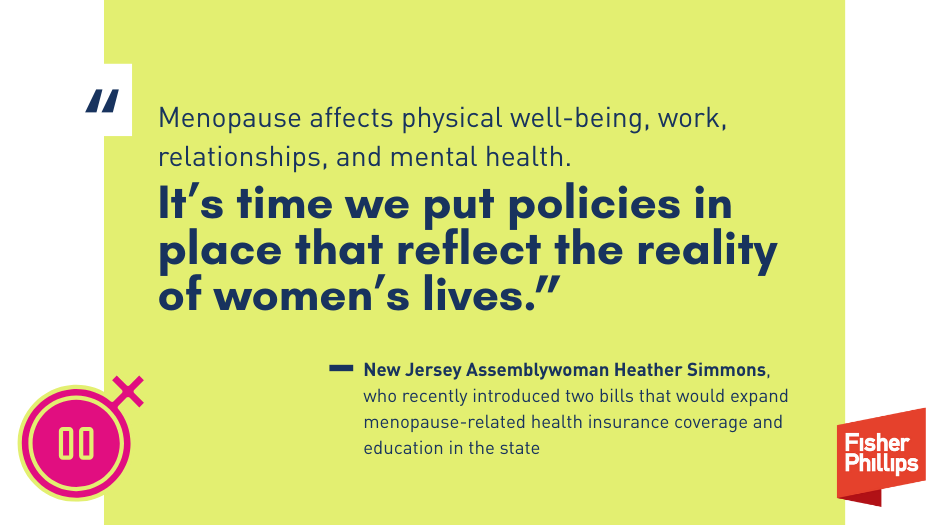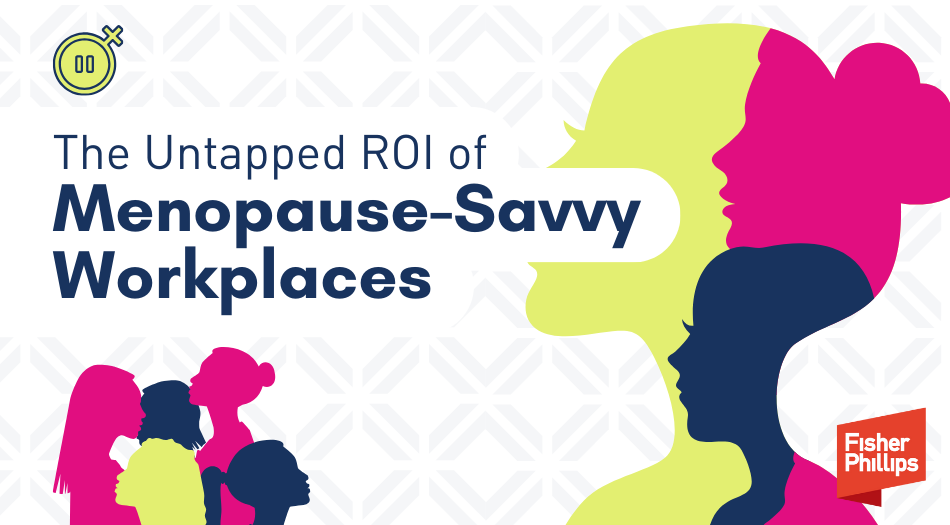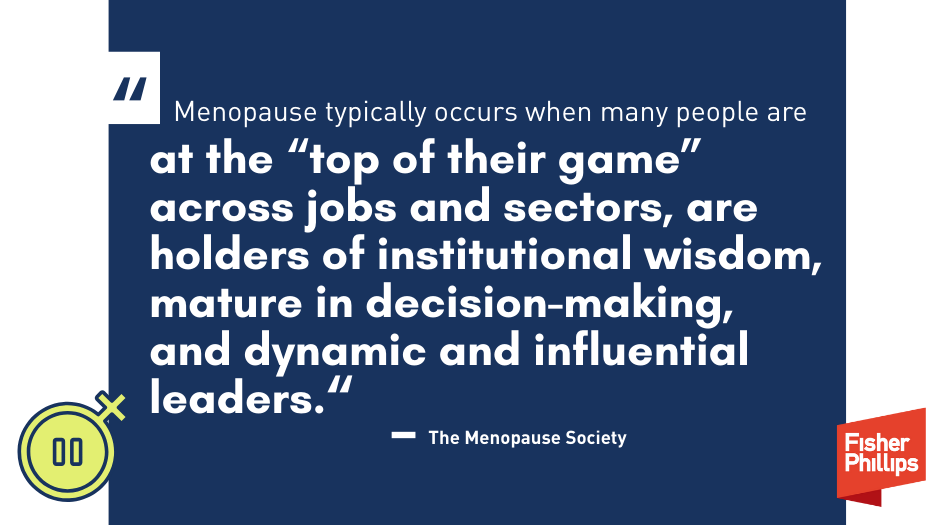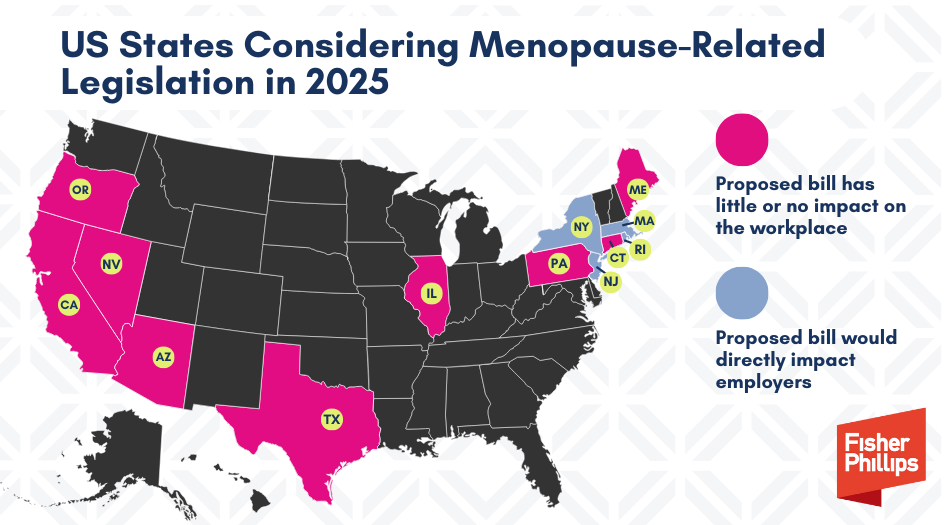Menopause – which impacts not only half of the global population but also one of the fastest-growing US workforce demographics – significantly impacts a woman’s overall health and can cause physical, mental, and cognitive changes that can disrupt many aspects of a woman’s life, including her career. Supporting your employees during this natural stage of life can help save you significant costs, boost productivity, and retain top talent. As lawmakers and our broader society increasingly demand greater awareness and better support for menopause-related issues, employers should tune in and take note. We’ll discuss the many misconceptions around menopause, the current but developing legal landscape surrounding it, and how building a menopause-savvy workplace can benefit both you and your employees.
How Does Menopause Impact Employers?
First, you might be wondering why your organization should invest the time or resources into building a menopause-savvy workplace. Here’s why you should consider doing so:
- Overall Workplace Culture. “Menopause-responsive workplaces retain employees, build culture and wellbeing, and benefit from a multigenerational workforce,” according to the “Making Menopause Work” initiative by The Menopause Society (TMS). The TMS website provides an abundance of free employer resources on supporting employees through this natural stage of life.
- Employee Retention – Especially for Top Talent. “People experiencing discomfort or pain may miss days of work or even leave their jobs, harming careers and well-being,” says TMS. Further, perimenopause and menopause typically impact women in their mid-30s to mid-50s “when many people are at the ‘top of their game’ across jobs and sectors, are holders of institutional wisdom, mature in decision-making, and dynamic and influential leaders.” The organization also notes that “midlife employees represent a large and growing percentage of today’s workforce and hold key positions in management and on the front lines.”
- Your Bottom Line. According to TMS, “unsupported menopause symptoms drive up employer healthcare costs and cause $1.8 billion in missed workdays, not to mention the added costs of reduced productivity and early retirement.”
Menopause Misconceptions
Menopause happens when a woman’s ovaries stop making estrogen and is confirmed after a woman goes one year without having any menstrual periods, according to the American College of Obstetricians and Gynecologists (ACOG). While this phase of life begins for about 1.3 million women in the US each year, and while a cultural shift is increasing menopause awareness, long-lasting misconceptions persist, according to a recent Yale School of Medicine article. Here are some key points you should know:
- Menopause is not a binary state. Menopause is preceded by a transitional stage called perimenopause. “Many people don’t realize that ovarian function begins to decline long before menopause – even, in some cases, up to ten years earlier,” Yale reports (linked above). Further, symptoms can linger into postmenopause, the life stage that follows an official confirmation of menopause.
- Menopause isn’t limited to a narrow age group. While the average age of menopause is 52 in the US – with most women starting the menopausal transition between the ages 45 and 55 – for many women, perimenopause begins in their 30s. In addition, some women experience early menopause (before age 45) or premature menopause (before age 40), and it can also be induced by certain surgical procedures and medical treatments.
- Menopause impacts much more than reproductive function. Last year, the New York Times reported on a growing area of research on whether delaying menopause is the key to longevity. As the report put it, scientists are finally realizing that the female reproductive system is “far more than just a baby-maker,” and that the ovaries “appear to be connected to virtually every aspect of a woman’s health.” For example, declining hormone levels in peri- and postmenopausal women can impact bone density, cardiovascular health, and cognitive function.
- Menopause is not a universal experience – or a well understood medical condition. The menopausal transition can trigger a wide range of symptoms, and there is no one-size-fits-all experience. This is especially true across races, as researchers have found major racial disparities in menopause symptoms and care. But one universal truth about menopause is that knowledge on the subject is seriously lacking in the medical community. AARP reported in 2018 that nearly 80% of medical residents surveyed did not feel equipped to discuss or treat menopause, and even among obstetrics and gynecology residency programs, only 20% provided any kind of menopause training.
- Menopause is not just a women’s issue. While menopause is a biological process that women experience, it also affects men, families, workplaces, and society at large. We’ll dive into the workforce impact further below.
Menopause and Workplace Law
Federal Law
The US currently does not have any federal laws that explicitly address menopause in the workplace. Further, federal courts and agencies have rarely weighed in on whether menopause-related conditions might be protected under various workplace laws such as Title VII of the Civil Rights Act (Title VII), the Pregnant Workers Fairness Act (PWFA), the Age Discrimination in Employment Act (ADEA), or the Americans with Disabilities Act (ADA). For example:
- Nearly 30 years ago, a federal court in Florida ruled that menopause, generally, is not a disability under the ADA – but suggested that menopause complications may qualify as a disability in some circumstances due to the “tremendous variation” in how the biological process impacts different women.
- Last year, the Equal Employment Opportunity Commission (EEOC) released new enforcement guidance on workplace harassment that explicitly acknowledged menopause-related protections in one example, stating that a manager making derogatory comments based on an employee’s actual or perceived menopausal symptoms could potentially be covered as both age and sex discrimination under the ADEA and Title VII. While the guidance has been the subject of legal disputes, the menopause-related portion remains in effect for now.
But the push for federal menopause-related legislation in general (though not yet directly related to the workplace) has been gaining more momentum. For example:
- Last year, a group of US senators introduced a bipartisan bill (titled the “Advancing Menopause Care and Mid-Life Women’s Health Act”) that would “boost funding for menopause research and give federal agencies new tools to better study and improve mid-life women’s health” (news release).
- In April, a group of congresswomen reintroduced a bipartisan bill (titled the “Servicewomen and Veterans Menopause Research Act”) that would require federal agencies to research and study the effects of menopause on women service members and women veterans (news release).
State Law
So far in 2025, one in four US states are considering bills – at least 21 in total – that aim to improve menopause care and treatment, according to A Citizen’s Guide to Menopause Advocacy.
Most of these bills have little or no impact on the workplace, but here are a few that would, if enacted, directly impact employers:
- Massachussettes. H2499 would, among other things, require the Executive Office of Labor and Workforce Development (EOLWD) to conduct a study to assess the “impact of menopause on the workforce and the breadth of menopause-related workplace policies offered by employers in the commonwealth.” Based on the results of the study, the EOLWD would quickly develop and release best workplace practices, including employee benefits and appropriate company culture for peri- and postmenopausal employees, as well as programs that increase awareness in the workplace of the menopause transition and related symptoms and chronic conditions.
- New Jersey. If enacted, S4197 would require employers to allow employees suffering from a wide range of menstrual disorders to work remotely in certain circumstances. As currently drafted, the bill appears to be broad enough to cover perimenopause – though it does not explicitly list it – if symptoms cause discomfort to the employee, and the employee is still able to perform their essential job duties.
- New York. State lawmakers have introduced at least two bills related to menopause in 2025. A5436 would require employers to make reasonable accommodations for an employee’s or job applicant’s menstrual-related or menopausal-related conditions (just like the state’s pregnancy accommodation requirements that have been in effect since 2016). Another bill (S3908) would expand the state’s workers’ compensation law to provide four days of paid leave for menstrual complications and menopause.
- Rhode Island. A new bill (S0361) would require employers to make reasonable accommodations for a current or prospective employee’s condition related to menopause or the need to manage the effects of vasomotor symptoms, like hot flashes, which are some of the most common menopausal symptoms. [Ed. Note: Gov. Dan McKee signed S0361 into law on June 24, 2025. The first-of-its-kind law took effect immediately.]

How to Build a Menopause-Savvy Workplace
You can take a wide variety of actions to support your employees in perimenopause or menopause, and The Menopause Society’s Employer Guide is an excellent, free resource for this. The guide offers science-backed tips on workplace initiatives ranging from creating an open culture to making physical work environments (as well as dress requirements) easier on symptoms. It also outlines different workplace policies you can consider creating or expanding to better serve your employees in this natural stage of life.
- For example, you might consider creating or expanding policies to allow flexible schedules, work-from-home options, and paid-time off for health-related reasons for employees experiencing perimenopause or menopause related symptoms.
- The guide also suggests training managers and supervisors “to understand that comments or actions taken because of menopause or its related symptoms could be a form of sex or age discrimination in violation of the company’s anti-discrimination policy.”
- You should work with counsel to navigate this rapidly developing area and better understand your legal obligations and employer best practices.
Conclusion
As state and federal lawmakers rally behind menopause-related legislation, we will monitor developments and provide updates as warranted, so make sure you are subscribed to Fisher Phillips’ Insight System to get the most up-to-date information direct to your inbox. If you have further questions, contact your Fisher Phillips attorney or the authors of this Insight.








